Welcome to the page of the cycle commission for science education.
The cycle commission consists of 11 teachers. These are specialists in mostly natural sciences. The study of the discipline is undeniably important, because it is based on the science of nature, which is intended to become a guide to the knowledge of the structure and functions of living organisms, their interrelationships, humanistic ideas, the ecological way of thinking, healthy way of life, social position, materialist outlook
The problem over which the cyclic commission works:
“The unity of theory and practice is the key to the formation of professional competence of a specialist”
Proceeding from this, the work of the cycle commission is also aimed at solving scientific and methodological problems, namely:
1. Ensuring the effectiveness and quality of the educational process through competence-oriented education.
2. Formation of socially active personality; capable of self-development and self-improvement in the profile education
Task:
– formation of students’ knowledge, skills and abilities necessary for the qualified and efficient use of modern information and communication technologies in educational and cognitive activities and everyday life;
– formation of the students’ ability to apply information and communication technologies in order to effectively solve various tasks related to obtaining, processing, storing, submitting information related to future professional activities in the conditions of the information society.
